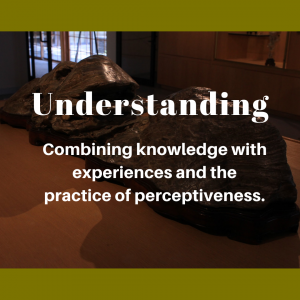
Description
Understanding is having clear insight into ideas and feelings. We thoughtfully seek to comprehend the full truth. We are mindful of what is most important. We are deeply present to others with compassion and accuracy, helping them to discern their own clarity. We go the extra mile to put ourselves in another’s shoes in order to forgive. We treasure knowledge, and use our minds as tools to explore what is real and true. We cherish the ability to see the whole picture.
Quote
“If one is master of one thing and understands one thing well, one has at the same time, insight into and understanding of many things.”
— Vincent Van Gogh
The Practice of Understanding
- I reflect on the meaning of ideas.
- I have empathy for others’ feelings.
- I am mindful of meaning.
- I am a discerning listener.
- I call on empathy in order to forgive.
- I value knowledge and perceptiveness.
Definitions and practices of virtue are used with permission from the Virtues Project™.
In Family Life
The virtue of understanding within a family is exemplified through open and empathetic communication, active listening, and a genuine effort to comprehend each other’s perspectives and emotions. It entails the ability to put oneself in family members’ shoes, seeking to grasp their experiences, thoughts, and feelings without judgment.
Understanding in a family setting also involves patience and tolerance, especially during disagreements or challenging moments, where family members strive to see beyond differences and find common ground. This virtue fosters a sense of unity, trust, and emotional support within the family, creating an environment where individuals feel heard, validated, and valued, ultimately strengthening the bonds that hold them together.
Balancing Understanding
Understanding stands as a beacon of enlightenment and compassion. It allows us to navigate the intricate tapestry of human emotions and ideas, offering clarity and empathy to those we encounter. To maintain a balanced understanding, it’s crucial to integrate other virtues into our lives:
-
-
- Empathy: This virtue complements Understanding by fostering emotional connection and compassion, allowing us to better relate to others.
- Discernment: Discernment helps us navigate when and how to extend our understanding, preventing us from becoming overly accommodating or vulnerable.
- Wisdom: Wisdom guides us in making thoughtful and informed decisions regarding when to apply understanding, preventing us from becoming enablers or pushovers.
- Open-mindedness: An open mind encourages us to consider diverse perspectives and expand our understanding, ensuring it remains broad and inclusive.
-
Whether preventing excessive empathy or combating cold indifference, a harmonious blend of virtues ensures that understanding remains a guiding light on our path to virtuous living.

